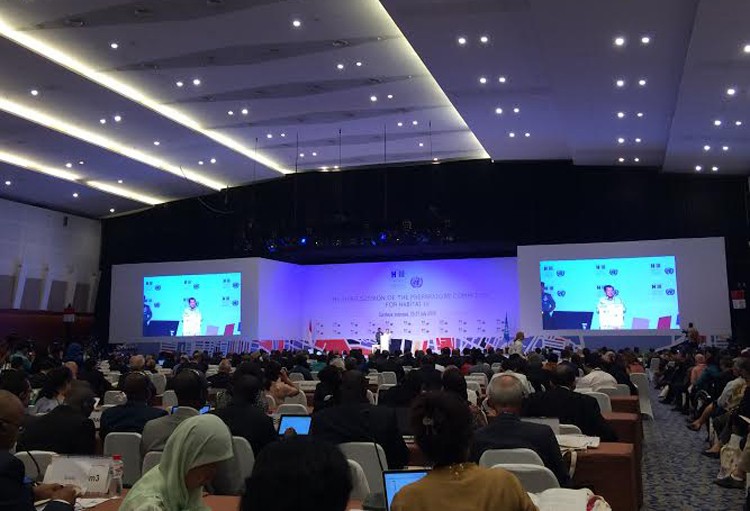Popular Reads
Top Results
Can't find what you're looking for?
View all search resultsPopular Reads
Top Results
Can't find what you're looking for?
View all search resultsRoad to a new urban agenda
A New Urban Agenda should therefore be seen as an important opportunity, not only for UN member states, but also other key players such as local governments. Demographic trends in the 21st century project that nearly 70 percent of people will settle in urban areas by 2050. Planning and designing cities would be smoother if we considered people the center of action.
Change text size
Gift Premium Articles
to Anyone
S
urabaya is coming under the world’s spotlight as it hosts the negotiations of the “New Urban Agenda” set for the next 20 years. It is not without reason that the government and the UN have chosen Surabaya for the third Preparatory Committee (PrepCom) of Habitat III.
Surabaya’s transformation into a much greener and cleaner place to live under the leadership of dynamic Mayor Tri “Risma” Rismaharini has catapulted the city to national and international fame. As mayor of Indonesia’s second-largest city, and sometimes the mother of her citizens, Risma has proven that a good leader requires not only firmness, but also compassion.
Physical changes on infrastructure are not sufficient. Equally important, and often more challenging, is how to build the character of society.
With more than a half of the world’s population inhabiting cities that contribute the lion’s share of global gross domestic product (GDP), huge challenges confront them. Many cities are major polluters, while traffic congestion, floods and slum areas (there are around 1 billion slum dwellers worldwide) are just a few of the countless problems that cities and local governments must deal with.
With these problems combined, the task to find solutions is evidently daunting, especially when planning is poor and government relatively weak and ineffective.
A New Urban Agenda should therefore be seen as an important opportunity, not only for UN member states, but also other key players such as local governments.
Demographic trends in the 21st century project that nearly 70 percent of people will settle in urban areas by 2050. Planning and designing cities would be smoother if we considered people the center of action.
Good quality and quantity, as well as the proportional distribution of safe public spaces that include streets, sidewalks, public markets, libraries and parks can serve as indicators as to whether a leader places genuine importance on the welfare of the people.
If local leaders have genuine minds to govern, their officials and institutions as a whole are capacitated legally, institutionally and financially and people are involved in the decision-making processes, we will see more and more cities morph into comfortable and safe places to live.
Local governments need communities to be involved and the private sector to invest. A transparent system in line with good governance principles, in which every stakeholder understands its roles and responsibilities, is imperative.
The ideal is to build a humanist city, where people can take full advantage of infrastructure and access to public goods and services and at the same time live in harmony with nature and their fellow inhabitants, respect each other’s religions, gender, race and ethnicity and preserve local wisdom and values.
Living in urban kampung fortifies social bonds, improves safety and curbs violence, without need to spend to CCTV, as people look out for each other.
How should Indonesia design its urban future? How can the plan for deregulation of local rules and principles under the Joko “Jokowi” Widodo administration contribute to creation of effective local governments rather than hindering their progress?
It is true that local governments should not take sole responsibility for failure in local actions.
The central government may have to review deregulation so as not discourage good mayors and local officials from acting. Jakarta should use a “carrot and stick” approach to push local governments to perform better.
With its relatively little experience in decentralization, Indonesia has achieved much, but there are huge gaps still to fill.
Let’s hope the UN preparatory meeting in Surabaya will facilitate meaningful negotiations amongst member states as well as local players with big stakes in implementing this New Urban Agenda that will be approved in Quito on Oct. 17 to 20. Let’s also hope that foreign delegates get to see what Surabaya and other Indonesian cities have achieved.
Thanks to the slogan “no one left behind”, let’s ensure that this New Urban Agenda can open the eyes of the public that we own this agenda and can’t wait to see our domestic stakeholders act. Let’s act now, before it’s too late.
***
The writer is secretary-general of United Cities and Local Governments Asia-Pacific (UCLG ASPAC). This is a personal view.
---------------
We are looking for information, opinions, and in-depth analysis from experts or scholars in a variety of fields. We choose articles based on facts or opinions about general news, as well as quality analysis and commentary about Indonesia or international events. Send your piece to community@jakpost.com.










